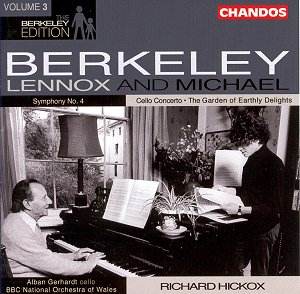Hot on the heels of
Volume Two comes the third instalment
of the Chandos Berkeley Edition. Into
the bargain we get a further valuable
recording, indeed a premiere recording,
of another Lennox Berkeley symphony.
Berkeley’s own somewhat understated
comment that the Fourth Symphony
is written in "a slightly more
expansive manner" than is usual
for the composer is all the more telling
when one considers the increasing economy
of his later style coupled with the
concision of the one movement Third
Symphony of nine years earlier.
In comparison the Fourth is a fleshier
three-movement affair that has at its
heart a set of variations (a form of
which Berkeley was both fond and a skilled
exponent) juxtaposing elements of slow
movement and more scherzo like material.
The opening movement
begins in hushed mystery on solo bass
clarinet before the Allegro proper is
announced, reaching a brief yet melodically
fulsome climax that returns later, often
in varying guises, but never in exact
repetition (a Berkeley trait). The subsequent
development of the early material is
followed by a final concluding flourish
before the second movement commences
with the theme of the central panel
of variations. Announced by string quartet
and subsequently taken up by the rest
of the strings Berkeley then takes us
through an initially twilit waltz, an
agitated yet ebullient Allegro of contrapuntal
energy, a slowly treading Lento that
has something of the character of a
funeral march rising to a climax before
dying away again, a lively and rhythmically
playful scherzo and a subdued, emotionally
probing Adagio in conclusion. Principally
marked Allegro, the final movement is
centred around the interval of the third
and subjects the opening rising motif
to a variety of transformations before
an emphatic if modest conclusion.
Michael Berkeley wrote
The Garden of Earthly Delights
for the National Youth Orchestra, who
gave its premiere, under the direction
of Mstislav Rostropovich at the 1998
Promenade Concerts. Unlike his father,
Michael Berkeley does not shy away from
orchestral gesture on a serious scale
and the work draws its inspiration from
the triptych by Hieronymus Bosch, utilising
the antiphonal acoustics afforded by
the Royal Albert Hall by placing soloists
at different points around the performing
space. Although the effect of this is
largely lost on CD the music speaks
clearly and powerfully with a number
of thematic cross-references to the
composer’s orchestral work Secret
Garden of the previous year and
included on Volume Two of the series.
The much earlier Cello
Concerto of 1983 was written before
Berkeley’s music took on a greater degree
of astringency in its harmonic and melodic
language, although the composer has
undertaken a number of revisions of
the work, notably in 1997 prior to a
performance at the Presteigne Festival
in Wales, but with further, smaller
scale revision for this recording. Cast
in one continuous but freely changing
span, Alban Gerhardt gives a committed,
technically impressive account and there
is much to enjoy in Berkeley’s often-attractive
melodic writing and vivid orchestration.
That said, I cannot help but feel that
it was not until Berkeley’s music went
through its subsequent stylistic transformation
that he really began to find his true
voice.
As with the preceding
two volumes of the series Chandos have
captured the music in full throated
sound, dynamically impressive and finely
balanced by the engineers. Richard Hickox
draws playing from the BBCNOW that stands
comparison with the finest, all-adding
up to a disc that should grace the collection
of anyone with an interest in British
music.
During a recent chance
meeting with Michael Berkeley, the composer
commented to me that there are further
volumes in an advanced state of planning,
with some material already in the can
and the prospect of a new commission
from Michael himself. Judging by the
results so far, there should be much
to still look forward to.
Christopher Thomas
